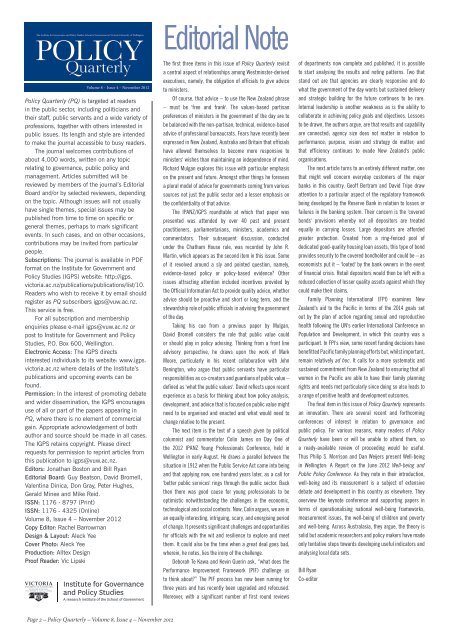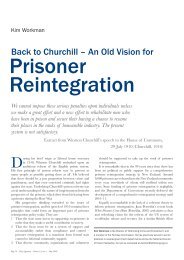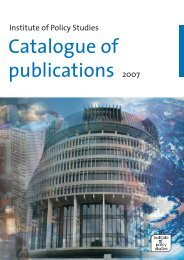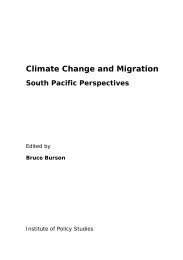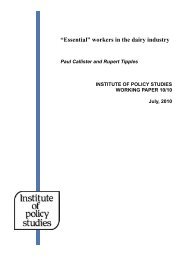PDF File - Institute for Governance and Policy Studies - Victoria ...
PDF File - Institute for Governance and Policy Studies - Victoria ...
PDF File - Institute for Governance and Policy Studies - Victoria ...
Create successful ePaper yourself
Turn your PDF publications into a flip-book with our unique Google optimized e-Paper software.
Editorial Note<br />
Volume 8 – Issue 4 – November 2012<br />
<strong>Policy</strong> Quarterly (PQ) is targeted at readers<br />
in the public sector, including politicians <strong>and</strong><br />
their staff, public servants <strong>and</strong> a wide variety of<br />
professions, together with others interested in<br />
public issues. Its length <strong>and</strong> style are intended<br />
to make the journal accessible to busy readers.<br />
The journal welcomes contributions of<br />
about 4,000 words, written on any topic<br />
relating to governance, public policy <strong>and</strong><br />
management. Articles submitted will be<br />
reviewed by members of the journal’s Editorial<br />
Board <strong>and</strong>/or by selected reviewers, depending<br />
on the topic. Although issues will not usually<br />
have single themes, special issues may be<br />
published from time to time on specific or<br />
general themes, perhaps to mark significant<br />
events. In such cases, <strong>and</strong> on other occasions,<br />
contributions may be invited from particular<br />
people.<br />
Subscriptions: The journal is available in <strong>PDF</strong><br />
<strong>for</strong>mat on the <strong>Institute</strong> <strong>for</strong> Government <strong>and</strong><br />
<strong>Policy</strong> <strong>Studies</strong> (IGPS) website: http://igps.<br />
victoria.ac.nz/publications/publications/list/10.<br />
Readers who wish to receive it by email should<br />
register as PQ subscribers igps@vuw.ac.nz.<br />
This service is free.<br />
For all subscription <strong>and</strong> membership<br />
enquiries please e-mail igps@vuw.ac.nz or<br />
post to <strong>Institute</strong> <strong>for</strong> Government <strong>and</strong> <strong>Policy</strong><br />
<strong>Studies</strong>, P.O. Box 600, Wellington.<br />
Electronic Access: The IGPS directs<br />
interested individuals to its website: www.igps.<br />
victoria.ac.nz where details of the <strong>Institute</strong>’s<br />
publications <strong>and</strong> upcoming events can be<br />
found.<br />
Permission: In the interest of promoting debate<br />
<strong>and</strong> wider dissemination, the IGPS encourages<br />
use of all or part of the papers appearing in<br />
PQ, where there is no element of commercial<br />
gain. Appropriate acknowledgement of both<br />
author <strong>and</strong> source should be made in all cases.<br />
The IGPS retains copyright. Please direct<br />
requests <strong>for</strong> permission to reprint articles from<br />
this publication to igps@vuw.ac.nz.<br />
Editors: Jonathan Boston <strong>and</strong> Bill Ryan<br />
Editorial Board: Guy Beatson, David Bromell,<br />
Valentina Dinica, Don Gray, Peter Hughes,<br />
Gerald Minee <strong>and</strong> Mike Reid.<br />
ISSN: 1176 - 8797 (Print)<br />
ISSN: 1176 - 4325 (Online)<br />
Volume 8, Issue 4 – November 2012<br />
Copy Editor: Rachel Barrowman<br />
Design & Layout: Aleck Yee<br />
Cover Photo: Aleck Yee<br />
Production: Alltex Design<br />
Proof Reader: Vic Lipski<br />
The first three items in this issue of <strong>Policy</strong> Quarterly revisit<br />
a central aspect of relationships among Westminster-derived<br />
executives, namely, the obligation of officials to give advice<br />
to ministers.<br />
Of course, that advice – to use the New Zeal<strong>and</strong> phrase<br />
– must be 'free <strong>and</strong> frank'. The values-based partisan<br />
preferences of ministers in the government of the day are to<br />
be balanced with the non-partisan, technical, evidence-based<br />
advice of professional bureaucrats. Fears have recently been<br />
expressed in New Zeal<strong>and</strong>, Australia <strong>and</strong> Britain that officials<br />
have allowed themselves to become more responsive to<br />
ministers' wishes than maintaining an independence of mind.<br />
Richard Mulgan explores this issue with particular emphasis<br />
on the present <strong>and</strong> future. Amongst other things he <strong>for</strong>esees<br />
a plural model of advice <strong>for</strong> governments coming from various<br />
sources not just the public sector <strong>and</strong> a lesser emphasis on<br />
the confidentiality of that advice.<br />
The IPANZ/IGPS roundtable at which that paper was<br />
presented was attended by over 40 past <strong>and</strong> present<br />
practitioners, parliamentarians, ministers, academics <strong>and</strong><br />
commentators. Their subsequent discussion, conducted<br />
under the Chatham House rule, was recorded by John R.<br />
Martin, which appears as the second item in this issue. Some<br />
of it revolved around a sly <strong>and</strong> pointed question, namely,<br />
evidence-based policy or policy-based evidence Other<br />
issues attracting attention included incentives provided by<br />
the Official In<strong>for</strong>mation Act to provide quality advice, whether<br />
advice should be proactive <strong>and</strong> short or long term, <strong>and</strong> the<br />
stewardship role of public officials in advising the government<br />
of the day.<br />
Taking his cue from a previous paper by Mulgan,<br />
David Bromell considers the role that public value could<br />
or should play in policy advising. Thinking from a front line<br />
advisory perspective, he draws upon the work of Mark<br />
Moore, particularly in his recent collaboration with John<br />
Benington, who argue that public servants have particular<br />
responsibilities as co-creators <strong>and</strong> guardians of public value –<br />
defined as 'what the public values'. David reflects upon recent<br />
experience as a basis <strong>for</strong> thinking about how policy analysis,<br />
development, <strong>and</strong> advice that is focused on public value might<br />
need to be organised <strong>and</strong> enacted <strong>and</strong> what would need to<br />
change relative to the present.<br />
The next item is the text of a speech given by political<br />
columnist <strong>and</strong> commentator Colin James on Day One of<br />
the 2012 IPANZ Young Professionals Conference, held in<br />
Wellington in early August. He draws a parallel between the<br />
situation in 1912 when the Public Service Act came into being<br />
<strong>and</strong> that applying now, one hundred years later, as a call <strong>for</strong><br />
'better public services' rings through the public sector. Back<br />
then there was good cause <strong>for</strong> young professionals to be<br />
optimistic notwithst<strong>and</strong>ing the challenges in the economic,<br />
technological <strong>and</strong> social contexts. Now, Colin argues, we are in<br />
an equally interesting, intriguing, scary, <strong>and</strong> energising period<br />
of change. It presents significant challenges <strong>and</strong> opportunities<br />
<strong>for</strong> officials with the wit <strong>and</strong> resilience to explore <strong>and</strong> meet<br />
them. It could also be the time when a great deal goes bad,<br />
wherein, he notes, lies the irony of the challenge.<br />
Deborah Te Kawa <strong>and</strong> Kevin Guerin ask, “what does the<br />
Per<strong>for</strong>mance Improvement Framework (PIF) challenge us<br />
to think about” The PIF process has now been running <strong>for</strong><br />
three years <strong>and</strong> has recently been upgraded <strong>and</strong> refocused.<br />
Moreover, with a significant number of first round reviews<br />
of departments now complete <strong>and</strong> published, it is possible<br />
to start analysing the results <strong>and</strong> noting patterns. Two that<br />
st<strong>and</strong> out are that agencies are clearly responsive <strong>and</strong> do<br />
what the government of the day wants but sustained delivery<br />
<strong>and</strong> strategic building <strong>for</strong> the future continues to be rare.<br />
Internal leadership is another weakness as is the ability to<br />
collaborate in achieving policy goals <strong>and</strong> objectives. Lessons<br />
to be drawn, the authors argue, are that results <strong>and</strong> capability<br />
are connected; agency size does not matter in relation to<br />
per<strong>for</strong>mance; purpose, vision <strong>and</strong> strategy do matter; <strong>and</strong><br />
that efficiency continues to evade New Zeal<strong>and</strong>'s public<br />
organisations.<br />
The next article turns to an entirely different matter, one<br />
that might well concern everyday customers of the major<br />
banks in this country. Geoff Bertram <strong>and</strong> David Tripe draw<br />
attention to a particular aspect of the regulatory framework<br />
being developed by the Reserve Bank in relation to losses or<br />
failures in the banking system. Their concern is the 'covered<br />
bonds' provisions whereby not all depositors are treated<br />
equally in carrying losses. Large depositors are af<strong>for</strong>ded<br />
greater protection. Created from a ring-fenced pool of<br />
dedicated good-quality housing loan assets, this type of bond<br />
provides security to the covered bondholder <strong>and</strong> could be – as<br />
economists put it – 'looted' by the bank owners in the event<br />
of financial crisis. Retail depositors would then be left with a<br />
reduced collection of lesser quality assets against which they<br />
could make their claims.<br />
Family Planning International (FPI) examines New<br />
Zeal<strong>and</strong>'s aid to the Pacific in terms of the 2014 goals set<br />
out by the plan of action regarding sexual <strong>and</strong> reproductive<br />
health following the UN's earlier International Conference on<br />
Population <strong>and</strong> Development, in which this country was a<br />
participant. In FPI's view, some recent funding decisions have<br />
benefitted Pacific family planning ef<strong>for</strong>ts but, whilst important,<br />
remain relatively ad hoc. It calls <strong>for</strong> a more systematic <strong>and</strong><br />
sustained commitment from New Zeal<strong>and</strong> to ensuring that all<br />
women in the Pacific are able to have their family planning<br />
rights <strong>and</strong> needs met particularly since doing so also leads to<br />
a range of positive health <strong>and</strong> development outcomes.<br />
The final item in this issue of <strong>Policy</strong> Quarterly represents<br />
an innovation. There are several recent <strong>and</strong> <strong>for</strong>thcoming<br />
conferences of interest in relation to governance <strong>and</strong><br />
public policy. For various reasons, many readers of <strong>Policy</strong><br />
Quarterly have been or will be unable to attend them, so<br />
a ready-available review of proceeding would be useful.<br />
Thus Philip S. Morrison <strong>and</strong> Dan Weijers present Well-being<br />
in Wellington: A Report on the June 2012 Well-being <strong>and</strong><br />
Public <strong>Policy</strong> Conference. As they note in their introduction,<br />
well-being <strong>and</strong> its measurement is a subject of extensive<br />
debate <strong>and</strong> development in this country as elsewhere. They<br />
overview the keynote conference <strong>and</strong> supporting papers in<br />
terms of operationalising national well-being frameworks,<br />
measurement issues, the well-being of children <strong>and</strong> poverty<br />
<strong>and</strong> well-being. Across Australasia, they argue, the theory is<br />
solid but academic researchers <strong>and</strong> policy makers have made<br />
only tentative steps towards developing useful indicators <strong>and</strong><br />
analysing local data sets.<br />
Bill Ryan<br />
Co-editor<br />
Page 2 – <strong>Policy</strong> Quarterly – Volume 8, Issue 4 – November 2012


